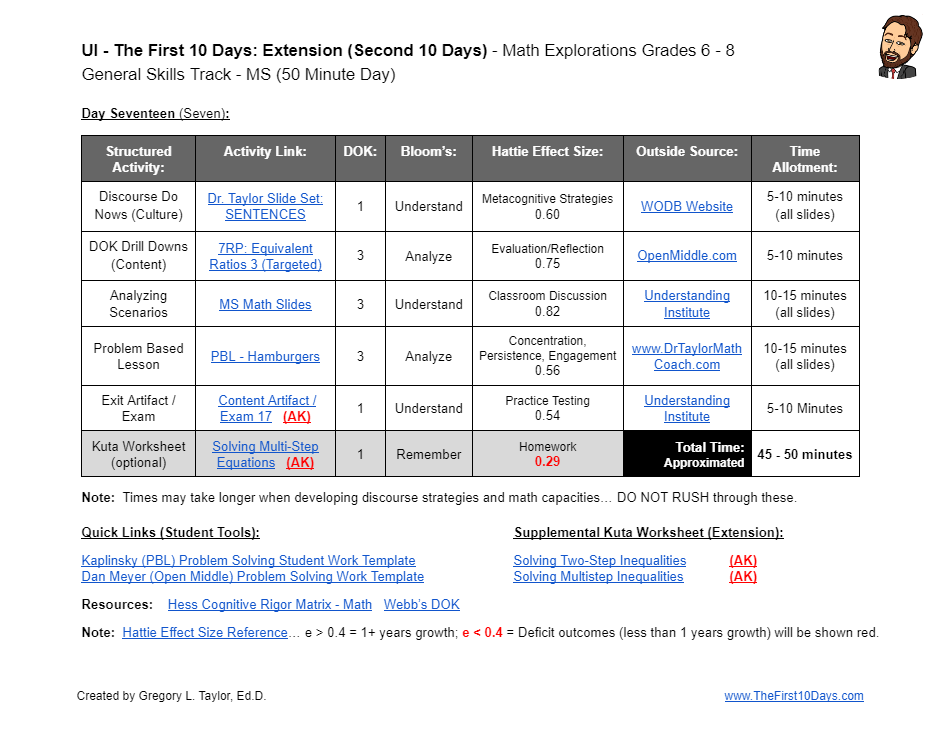|
Middle School Aligned Resources: (Traditional Grades 6-8)
|
...Set the Foundation
|
DAY SEVEN (17) - Engagement Activities Matrix
User General Notes:
Discourse Do Now: Although the guide says "all slides" we are not obligated to that list of slides... "any slide" could be used at any time. The important thing is we DO NOT RUSH the process of classroom culture development regarding speaking freely into the group. Use the time allotment as a guide rather than trying to "cover" all of the slides.
DOK Drill Down: These are a single slide exploration... let the student "struggle" for a bit before eliciting their ideas into the main group. DO NOT offer your ideas or strategies. This is where perseverance for the necessary struggle of understanding is developed. Allow them room to think and revise. Many of these were gleaned and/modified form openmiddle.com and put into a more usable form. For those slides gleaned directly from the site, a link on the slide will take you to their hints and answers for instructional assistance.
Algebra Slides: This is where the progression of slides is important... and the notion of "all slides" should be respected as much as possible with time constraints and student tangential discussions. PLEASE go in order and, once again, let the student "struggle" for a bit before eliciting their ideas into the main group. DO NOT offer your ideas or strategies. DO NOT RUSH them to "cover" all of the slides (we can always explore further the next day if needed). Ask them open questions and DO NOT FUNNEL them to "procedure". Rather, gently nudge them toward expressing their own explanations of what they think the correct procedures might be, and (MOST IMPORTANTLY) why.
Pattern Recognition Activities (PRA): These are definitely as bit more time consuming. DO NOT RUSH them through these. Keeping that in mind, we must assist them (at times) in moving forward with the struggle (without "telling" or "funneling" questions). Use small groups (3-4) for assessing student initial thoughts/noticings, and then use a "share out" with whole class as you proceed through the slide set. This small to large group analysis should spiral a number of times as we move through the slide set. The culminating event is a student generated function with rationale to support the group consensus. It may take a few PRA experiences to get them through an entire activity in a timely manner, but remember... timeliness is NOT the goal. Perseverance and struggle for understanding is the prize we seek.
Problem Based Learning (PBL): These are scenario embedded explorations which lend themselves to "open middled" learning strategies. These also take time and should be approached with a similar mindset as discussed for the PRAs above. Allow a spiraled small group to whole class set of experiences and gently question student notions for CLARIFICATION (not correctness)... they will find their own errors in the clarifying process. This self discovery is the most powerful tool in developing "self directed" learners who can attack a new and unfamiliar problem/scenario with confidence.
Exit Tickets: These are a quick assessment of the materials discussed and explored for that particular "day" of the First 10 Days. These are not mandatory in that we may not fully finish the exploration in time... but having an exit ticket is a powerful formative for planning future spirals of various topics and standards as the school year progresses. Answer keys are provided to help with understanding the type of answers we are hoping students will generate.
Kuta Supplements (Worksheets): These are for the teacher who finds homework "crucial". It is our opinion that a rich classroom experience negates the need for extensive homework (we recommend 3-5 questions: covering "easy", "moderate" and one "difficult" problem). AS A NOTE - Kuta worksheets are not always perfectly aligned to the daily activities... but they are progressive in how they are organized throughout the First 10 Days experience. They are mainly included herein for extension and intervention as necessary.
Discourse Do Now: Although the guide says "all slides" we are not obligated to that list of slides... "any slide" could be used at any time. The important thing is we DO NOT RUSH the process of classroom culture development regarding speaking freely into the group. Use the time allotment as a guide rather than trying to "cover" all of the slides.
DOK Drill Down: These are a single slide exploration... let the student "struggle" for a bit before eliciting their ideas into the main group. DO NOT offer your ideas or strategies. This is where perseverance for the necessary struggle of understanding is developed. Allow them room to think and revise. Many of these were gleaned and/modified form openmiddle.com and put into a more usable form. For those slides gleaned directly from the site, a link on the slide will take you to their hints and answers for instructional assistance.
Algebra Slides: This is where the progression of slides is important... and the notion of "all slides" should be respected as much as possible with time constraints and student tangential discussions. PLEASE go in order and, once again, let the student "struggle" for a bit before eliciting their ideas into the main group. DO NOT offer your ideas or strategies. DO NOT RUSH them to "cover" all of the slides (we can always explore further the next day if needed). Ask them open questions and DO NOT FUNNEL them to "procedure". Rather, gently nudge them toward expressing their own explanations of what they think the correct procedures might be, and (MOST IMPORTANTLY) why.
Pattern Recognition Activities (PRA): These are definitely as bit more time consuming. DO NOT RUSH them through these. Keeping that in mind, we must assist them (at times) in moving forward with the struggle (without "telling" or "funneling" questions). Use small groups (3-4) for assessing student initial thoughts/noticings, and then use a "share out" with whole class as you proceed through the slide set. This small to large group analysis should spiral a number of times as we move through the slide set. The culminating event is a student generated function with rationale to support the group consensus. It may take a few PRA experiences to get them through an entire activity in a timely manner, but remember... timeliness is NOT the goal. Perseverance and struggle for understanding is the prize we seek.
Problem Based Learning (PBL): These are scenario embedded explorations which lend themselves to "open middled" learning strategies. These also take time and should be approached with a similar mindset as discussed for the PRAs above. Allow a spiraled small group to whole class set of experiences and gently question student notions for CLARIFICATION (not correctness)... they will find their own errors in the clarifying process. This self discovery is the most powerful tool in developing "self directed" learners who can attack a new and unfamiliar problem/scenario with confidence.
Exit Tickets: These are a quick assessment of the materials discussed and explored for that particular "day" of the First 10 Days. These are not mandatory in that we may not fully finish the exploration in time... but having an exit ticket is a powerful formative for planning future spirals of various topics and standards as the school year progresses. Answer keys are provided to help with understanding the type of answers we are hoping students will generate.
Kuta Supplements (Worksheets): These are for the teacher who finds homework "crucial". It is our opinion that a rich classroom experience negates the need for extensive homework (we recommend 3-5 questions: covering "easy", "moderate" and one "difficult" problem). AS A NOTE - Kuta worksheets are not always perfectly aligned to the daily activities... but they are progressive in how they are organized throughout the First 10 Days experience. They are mainly included herein for extension and intervention as necessary.






